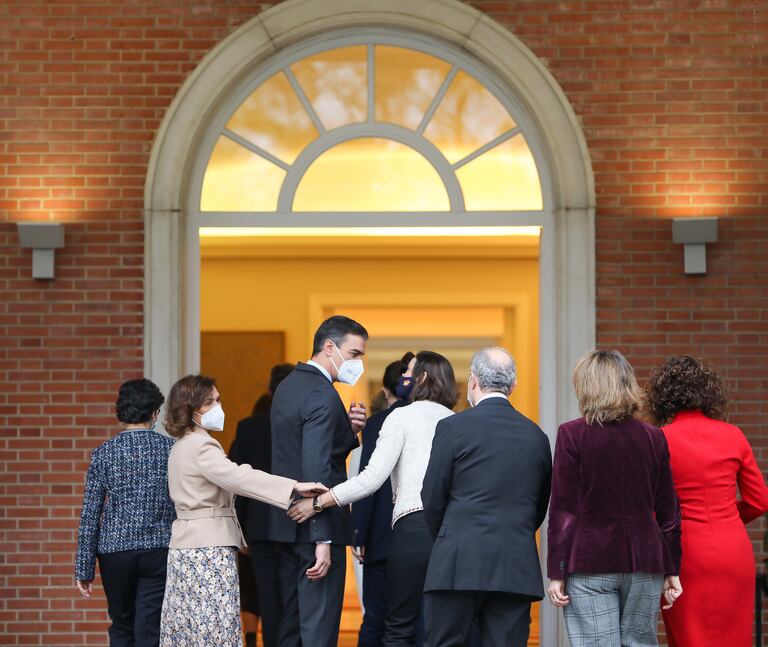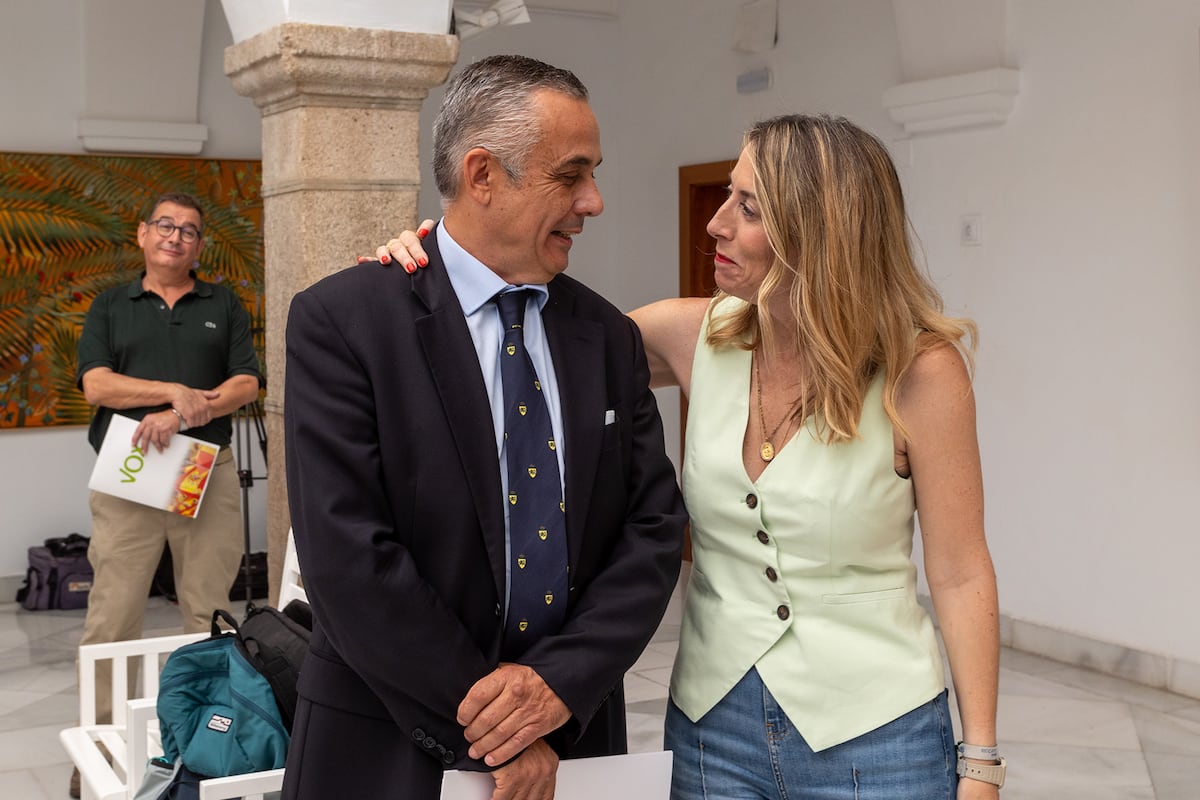Pedro Sánchez, in the middle, speaks with the Minister of Tourism, Reyes Maroto, this Tuesday in La Moncloa before the Council of Ministers.Marta Fernández Jara / Europa Press
The communities are redoubling their efforts so that the Executive will give his arm to twist and open the tap to direct aid, according to those responsible for the six most tourist regions in statements to EL PAÍS.
The PSOE-Podemos coalition government presented at the end of the year a rescue plan for the hotel industry, commerce and tourism in general.
But he announced that the responsibility for financing direct aid would fall on the communities.
The most tourist areas complain of a lack of support from the Government.
They feel helpless before the third wave and give up the Easter season.
The debate on direct aid has reached all Administrations.
Within the Executive, the differences are becoming more noticeable and the discussion is growing about what to do to avoid a cascade of company closures.
The communities, for their part, have demanded more support from the companies for months, although their requests have fallen on deaf ears.
At least until now.
“We are going to have to redouble our efforts and push harder.
ERTEs are a good mechanism, but for companies to survive, especially small ones, more measures are needed ”, acknowledges the Minister of Tourism of an autonomy whose economic engine is that sector.
The regions - especially the most touristy ones - consider the rescue plan for hotels and businesses presented by the Government last December to be very scarce.
“The mosqueo is very great among the autonomies and thus it has been transmitted to the Ministry [of Tourism] and the Secretary of State.
Expectations were generated that were later not met and the responsibility for direct aid was passed to the communities, something that was not agreed upon ”, explains another counselor in the field.
THE COUNTRY has spoken with half a dozen regional tourism advisers, belonging to governments of all political colors, and the feeling of helplessness is widespread.
One of those that has been launching its open criticism for weeks is Catalonia in the face of the Executive's refusal to grant direct subsidies.
The Generalitat sent a letter to President Sánchez in which they demanded a non-return fund of 50,000 million that would reach all sectors.
Sources from the Ministry of Industry, Commerce and Tourism insist that only the communities can offer these aid immediately.
“We would need to ask Brussels for permission and create a mechanism that would delay aid for at least four months.
For this reason, when this option was studied, it was decided to reduce company costs and inject money into the communities, which has been done through the React-EU fund, which will be able to dedicate it to what they consider most necessary ”, explains a Ministry spokesperson.
Other sources in the department headed by Reyes Maroto explain that the European React fund - created to strengthen education, health and social services, as well as to support SMEs and the self-employed - offers money (8,000 million in 2021 and 2,000 million in 2022 ) to lost fund, and they trust that it will be used to help tourism, especially in the Levant and the islands.
The problem, state the autonomies, is that it will not give for everything.
"They tell us to use it for this, but then they will criticize us for not dedicating it to health or education," complains another counselor.
In Andalusia, President Juan Manuel Moreno Bonilla insists that his resources are limited.
And he has already asked Sánchez on several occasions for a tax cut or temporary abolition and more aid to the productive fabric.
To these claims, government sources respond with a review of everything approved: “ERTE, helps self-employed, exemptions in Social Security contributions ... you can call it whatever you want, but they are direct aid even if you don't put the money in the hand of the businessman ”, they insist.
Despite this, more gasoline will be needed.
And these sources admit that the debate is open.
More indebtedness
For the cases in which the React is not enough, they affect the ministry, the communities have the capacity to request financing - although that money will have to be returned.
"The spending rule has been suspended, so you can borrow and allocate the money to these aid."
However, among the councilors of the branch this discourse does not penetrate and the criticisms remain.
For example, Yaiza Castilla, from the Canary Islands, who demands more support: “A specific tourism plan for the Canary Islands is necessary.
The measures that exist so far are not enough, the Government of Spain has to help ”.
In which Marta Rivera de la Cruz, Minister of Tourism of the Community of Madrid agrees: "It is surprising that the Government has not arbitrated a direct aid plan for some time as in other countries."
The differences with the line marked by the Executive are also glimpsed within the coalition government.
The wing of Unidas Podemos, as well as some socialist ministers, believe that the tap should be turned on.
Although the economic hard core - the Vice Presidency of Economic Affairs and the Ministry of Finance - prefer to endure, monitor the situation and not put at risk accounts that are highly stressed by the crisis.
Despite this, comparisons with other community partners leave the country in a bad place.
According to a report by the ECB, Spain is the state that dragged its feet the most when it came to taking out the checkbook against the crisis in 2020: it spent 1.3% of its gross domestic product on fiscal stimuli compared to an average somewhat higher than 4 %.
And it was far from Lithuania and Austria, which spent more than 6%.
According to the Ministry of Economy, the disbursement in Spain rises to 5.5% because it counts the cost of ERTE, an item that the ECB does not account for in any country.
Dripping programs
The communities, while waiting for a turnaround from the Government of Spain, have launched different rescue plans.
Of course, each one with different intensity, which can increase the differences between regions.
In fact, this Wednesday the Hospitality Industry of Spain was criticizing that only four of the 17 autonomies had given direct aid to their sector.
And sources from the Administration compared what was offered in general since December 22 - when the plan for the hotel and trade industry was approved - by the regional governments in which the PSOE is (468.8 million) and in which the PP (78.6 million).
Among those most affected by the coronavirus crisis are the two archipelagos.
In the Balearic Islands, the Government of Francina Armengol presented a package of measures for the most affected sectors in mid-January for a total amount of 103.5 million euros.
Of these, 53.5 million will be direct aid and the other 50 million will be guarantees.
"Between all of us we have to continue improving aid," said Iago Negueruela, Minister of Tourism, when presenting the plan.
In the Canary Islands, another region that is severely suffering the crisis due to its dependence on international tourism and air mobility, the tourism sector has just lost its high season.
For this reason, the community is finalizing a package of direct aid: according to regional government sources, the amount of the plan will exceed 165 million euros.
"It will be financed with React funds and, whatever is missing, with debt," explain spokespersons for the Ministry of Economy.
Despite this, they insist that it will not be enough and ask the government for help.
Another of the most tourist autonomies, Catalonia, is immersed in an electoral process, which can slow down even more the arrival of new plans.
Until now, the Government has activated three specific aid packages for the tourism sector since the crisis began, totaling 32.5 million euros.
In addition, for the entire commercial and restaurant sector, especially self-employed workers, the Generalitat has put more aid on the table, but it is difficult to know what the specific impact on tourism businesses is.
In the Valencian Community, for its part, the Resist Plan designed by the regional government has planned a total of 340 million euros in direct aid to support the sectors most affected by the new restrictions, especially tourism.
And in Andalusia, the Junta approved in January a line of 46 million euros in direct aid to small and medium-sized companies.
Of these, tourism has benefited about 22 million.
With information from
Dani Cordero
(Barcelona),
Cristina Vázquez
(Valencia) and
Nacho Sánchez
(Málaga).


/cloudfront-eu-central-1.images.arcpublishing.com/prisa/FNKLLK5XKNWEKUJYBF4ZFC5S6U.jpg)





/cloudfront-eu-central-1.images.arcpublishing.com/prisa/USPGW4YAYJFFPIEU4G5GZEUJ4Q.jpg)
/cloudfront-eu-central-1.images.arcpublishing.com/prisa/TLU7IJNDQXDEINQIXHLDKFJXXU.jpg)